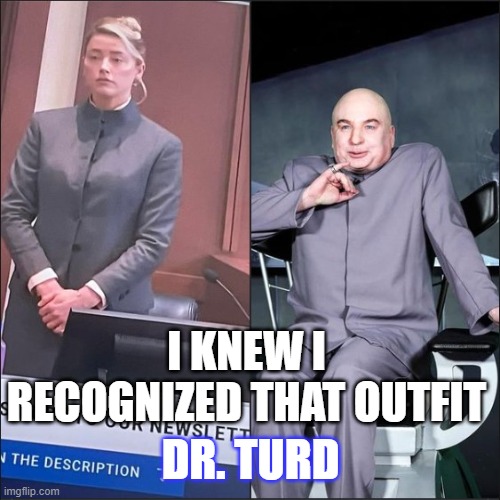Amber Heard had personality disorders linked to violence and 'making up stories,' a clinical psychologist who evaluated her says
A clinical psychologist who evaluated Amber Heard testified in Johnny Depp's trial against her. She said Heard "was grossly exaggerating" PTSD symptoms and downplayed Heard's personal issues. Heard had disorders associated with violence toward romantic partners, the psychologist said.
A forensic clinical psychologist who evaluated Amber Heard testified in court Tuesday that she diagnosed the actor with
borderline personality disorder and
histrionic personality disorder. The scores Heard received on professional psychological tests were associated with people who were "
full of rage" and "socially sophisticated," Shannon Curry, the psychologist, said. "These people might have that anger kind of explode out at times," Curry said. "They tend to be very passive-aggressive. They may be self-indulgent, very self-centered. They could use manipulation tactics to try to get their needs met. They're very needy of attention, acceptance, approval."
Curry was called to the witness stand by lawyers for Johnny Depp, who is suing Heard. He alleges Heard defamed him when she described herself as a victim of domestic violence in 2018 — a characterization that Depp denies. His lawsuit also alleges that Heard physically and verbally abused him throughout their relationship until their 2016 divorce. Heard has doubled down on her allegations with a countersuit.
Prior to the trial,
a different psychologist had diagnosed Heard with post-traumatic stress disorder, which she attributed to her relationship with Depp. After Heard disclosed the evaluation in court filings, Depp's lawyers convinced the judge overseeing the case to allow them to retain Curry for a separate evaluation.
Curry evaluated Heard for 12 hours in December over two days and analyzed earlier treatment records, recordings, and other documentation her lawyers provided, she said.
Curry said Heard "did not have PTSD" and appeared to be "grossly exaggerating" symptoms.
"She initially said, 'Yes, I have 19 of the 20 symptoms.' That's not typical, even of somebody with the most disabling form of PTSD," Curry said on the stand in the Fairfax, Virginia, courthouse where the trial is taking place. "When we eventually sort of dialed it down, there were three remaining symptoms." She diagnosed Heard with other psychological disorders. "The results of Ms. Heard's evaluation supported two diagnoses: borderline personality disorder and histrionic personality disorder," Curry said.
Heard may have feared abandonment
The evaluations, Curry said, involved looking into Heard's home life, her relationship with her family — which Heard has said involved abuse — school life, friendships, career history, and other personal relationships. Among the tests she used was the Minnesota Multiphasic Personality Inventory, commonly known as the MMPI-2, which is used to diagnose personality disorders.
Curry said she prepared a 25-page interpretation following the test. She concluded that Heard had "a very sophisticated way of minimizing any personal problems," while having
"a lot of inner hostility" and externalizing blame.
Borderline personality disorder, Curry said, is a
disorder of "instability" in personal relationships, emotions, and a person's sense of self. A driving factor, she said, is the
"underlying terror of abandonment."
"When somebody is afraid of being abandoned by their partner or by anybody else in their environment, and they have this disorder, they'll make desperate attempts to prevent that from happening," Curry said. "And those desperate attempts could be physical aggression."
She added that borderline personality disorder was "a predictive factor for women who implement violence against their partner."
"If their partner wants to get space from all of this intense emotion, oftentimes, they will be abusive to their partners in these situations," Curry said. "Sometimes, they'll physically restrain them from leaving and become injured that way." People with the disorder can express
"explosive anger" as a result of perceived slights, Curry said, in a way that can be "exhausting for their partners." "Oftentimes, their partners will try to make them happy at first and really allow themselves to be a punching bag, thinking that they can somehow solve this problem, that somehow they can make this better," Curry said. "And eventually, it just overwhelms them."
Curry's assessment resembles the testimony of
Laurel Anderson, a therapist who oversaw marriage-counseling sessions with Depp and Heard. Anderson said earlier in the trial that
Heard dominated conversations and had poor listening skills. Depp's relationship with Heard, Anderson said, triggered
"mutual abuse" among the couple. Anderson added that
Heard told her she "escalated" arguments to violence if she was afraid Depp would leave her. Other w
itnesses said they sometimes saw Heard physically cling to Depp when he tried to walk away from an argument.
"You're going to see a lot of this escalation in the bizarre behavior," Curry said on Tuesday. "They can react violently. They can react aggressively. They will often physically prevent their partner from trying to leave." 'They might take the victim role or the princess role, and even make up stories'
Depp testified earlier in the trial that he planned to leave Heard, after years of constant fighting, following the death of his mother. Heard preempted that by filing a restraining order that included photos of her bruised face, in an incident she blamed on Depp but which Depp and his employees testified was fabricated.
According to Curry,
people with borderline personality disorder often "make threats using the legal system" when threatened with abandonment. "They might say that they are going to file a restraining order or claim abuse, or they might do these things, to essentially try to keep their partner from leaving," Curry said. "In the moment, they're not consciously thinking, 'I'm going to keep my partner from leaving right now.' They're just thinking, 'I can't stand this. I hate my partner.'" Curry added: "They went from idealizing to suddenly devaluing because of the hurt. And they'll do anything to express that big emotion of anger."
The psychologist also said Heard approached her evaluation in a way that downplayed her psychological issues. "She approached it in a manner that very clearly minimized any psychological dysfunction. Not just that, but really
presented herself as free of any problems," Curry said. "And she did so in a way that was very sophisticated, not obvious, by responding to questions that most people might not notice are trying to detect that."
Heard's MMPI test produced a "code type" associated with "cruelty," Curry said, as well as people who are
"very attention-seeking" and
"prone to externalizing blame, to a point where it's unclear whether they can even admit to themselves that they do have responsibility."
Curry said the results demonstrated that
Heard could see herself as an "avenger against injustice" without seeing her own faults. "They have a capacity to kind of offer some of their faults but only the ones that people think of lightly and can all relate to," she said. "And so they can present as very fair and balanced, but in actuality, they really might be very judgmental of others and unaware of problems in their behavior around their thinking."
Before Depp finished his testimony on Monday, he said on the stand that Heard was jealous of his friendship with Paul Bettany. The "WandaVision" actor was such a threat to Heard, Depp said, that
she once drove Bettany's 18-year-old stepson to tears in an argument. People with histrionic personality disorder, Curry said, often want to be the center of attention even when they have little to say. When they see the attention of people around them waning,
they may make up stories, Curry said. "
They might take the victim role or the princess role, and even make up stories," Curry said. "Sometimes, those are to bolster the victim role. Sometimes,
those stories are just to make them look more interesting or accomplished in their mind so that they can get respect and attention that way.

























